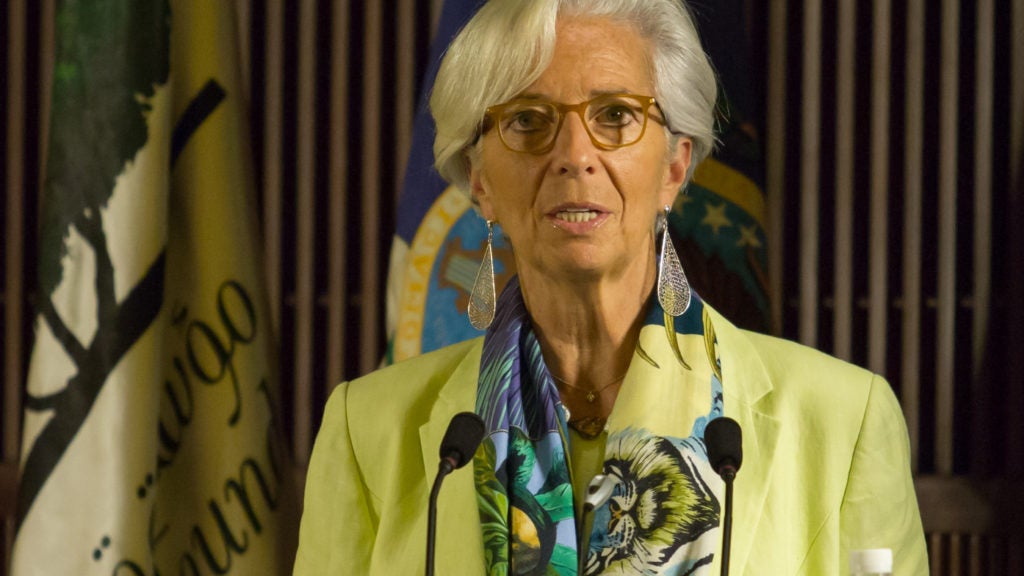IMF Managing Director Christine Lagarde Discusses Implications of Global Economic Transitions with Georgetown University Students

Georgetown University in Qatar (GU-Q), in conjunction with the Qatari Ministry of Finance, co-hosted the Managing Director of the International Monetary Fund (IMF) for a “A Conversation with Christine Lagarde”, a public event where the university’s students along with invited students from several schools in Qatar had the opportunity to engage with Ms. Lagarde on the economic challenges facing the country, region, and worldwide, as well as the role of education in meeting those challenges.
Ms. Lagarde was in Doha to participate in the GCC meeting of finance ministers and central bank governors. In bringing this event to Georgetown University, the Ministry of Finance was pleased to provide the youth of Qatar with an opportunity to discuss with Ms. Lagarde their role in shaping the future of the region’s economy, and the avenues for applying the skills they develop throughout their time in school and university.
Ms. Lagarde commented on the importance of the role of Georgetown and all educational institutions in addressing economic challenges, saying: “From both a personal perspective, the IMF point of view, as well as of those who try to support development, we believe the best investments you, your parents, and your sponsors can make is to invest in education,” said the first woman to head the IMF. “So what you’re doing at the moment is exactly what you should be doing. This country and their leaders are doing an awful lot towards contributing to education and culture and this is a really smart way to develop people, countries, and economies.”
Describing the world economic outlook from the IMF perspective as “a bit fragile, quite uneven, and in complete transition”, she advised students to focus on a post-graduation career in the private sector and away from the traditional security of a public sector or government job. Noting the new austerity measures many countries in the GCC have pursued following the drop in oil and gas prices, she encouraged students to see the transition as a “wake up call” for single-resource economies, and to see opportunities in the new economic reality.
“What could be regarded as a negative situation can actually be transformed so that an economy continues to be working appropriately,” she said. “Other activities have to be considered, your business model will be considered, private sector jobs might be interesting, demonstrating entrepreneurship and demonstrating value by yourself may be interesting. So given market circumstances as well as geopolitical changes, I hope that you all consider multiple options, not just joining the public sector, or doing what your parents did, but do completely different things, take risks. Even if you fail, you can bounce back and try again.”
The Managing Director was introduced by the dean of Georgetown, Dr. Gerd Nonneman, who said, “We are grateful to the Ministry of Finance for selecting Georgetown as their partner for this event. We’d like to think we were a natural choice – not only because our focus is on global affairs in the broadest sense, but also because one of our claims to fame is our program in International Economics. I’m delighted that so many young people are here – not only our own Georgetown students, but many from across Doha
Both the dean and Ms. Lagarde, who was in Doha to attend high level meetings with the finance ministers and central bank governors of the Gulf Cooperation Council, made special note of former Georgetown students in the audience who now work in the finance ministry of Qatar.
For the valuable opportunity to ask questions directly to the top leader of one of the world’s leading financial institutions, Georgetown also invited students from Qatar University, the College of the North Atlantic in Qatar, the American School of Doha, and several schools from Education City. The International Monetary Fund (IMF) is an organization of 188 countries, working to foster global monetary cooperation, secure financial stability, facilitate international trade, promote high employment and sustainable economic growth, and reduce poverty around the world.